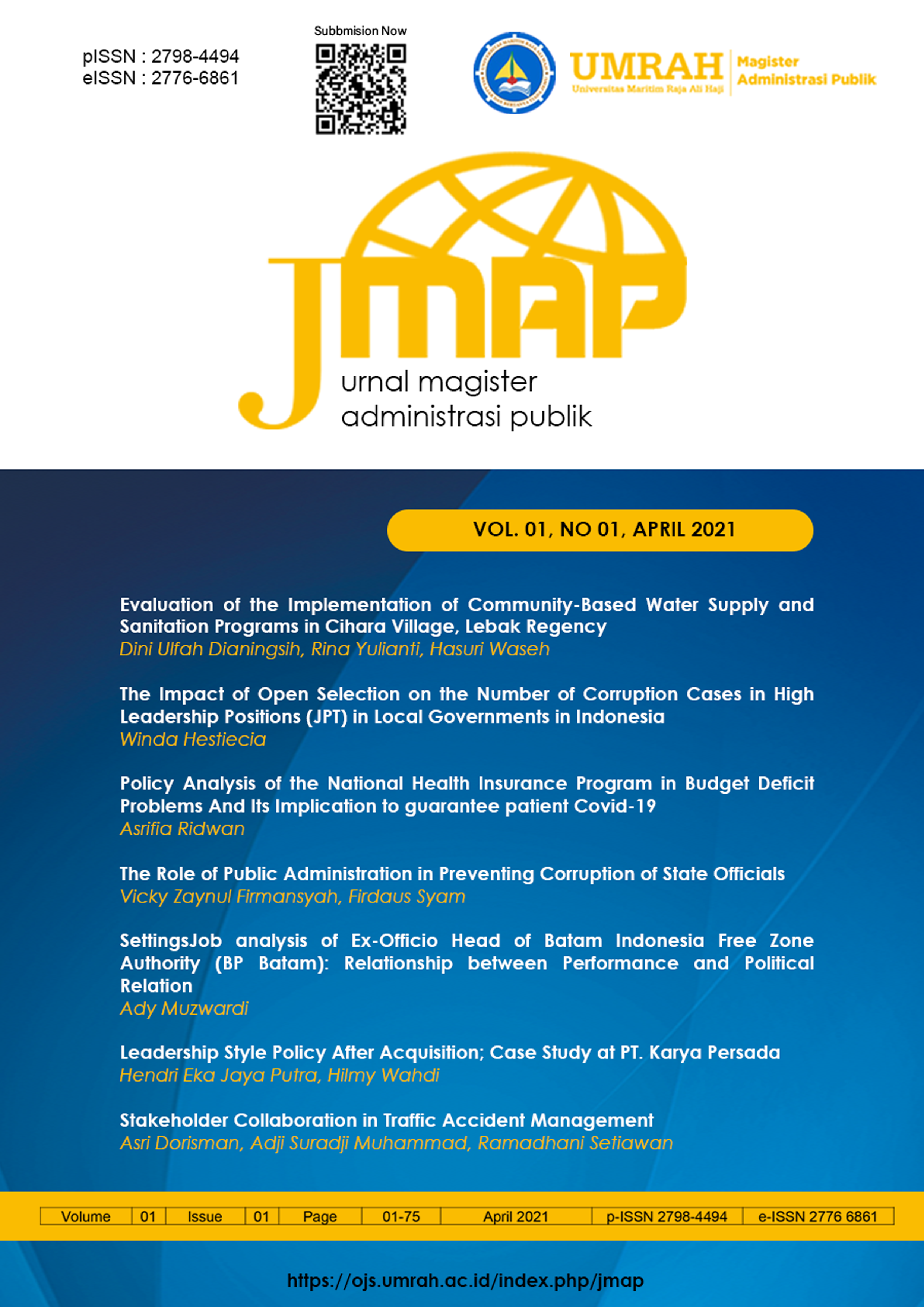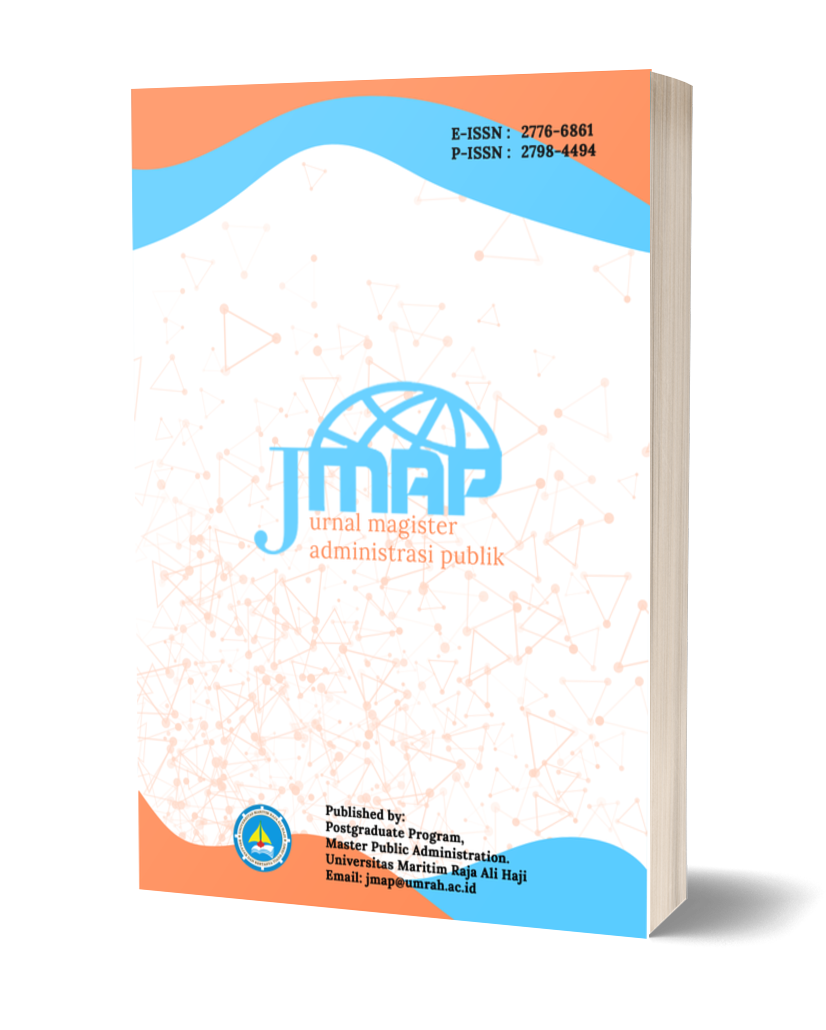Evaluation of the Implementation of Community-Based Water Supply and Sanitation Programs in Cihara Village, Lebak Regency
DOI:
https://doi.org/10.31629/jmap.v1i1.3321Keywords:
Evaluation, Implementation, Sanitation, VillageAbstract
This study aims to evaluate the implementation of Community Based Drinking Water and Sanitation Provision III in Cihara Village, Cihara District, Lebak Regency. The theory used is the evaluation theory by Dunn (2003: 610), namely effectiveness, efficiency, adequacy, equity, responsiveness, and accuracy. The method used is descriptive with a qualitative approach. The result of this research is that the implementation of the PAMSIMAS III program in Cihara Village, Cihara District, Lebak Regency has not run optimally. Suggestions that become recommendations for supervision from related agencies after the construction of facilities is complete and there are efforts from related agencies to provide awareness to the community about the importance of PHBS, community self-help groups have strategies so that people can participate in the form of in-cash contributions and in deliberations, and the existence of cross subsidies for infrastructure maintenance fees for people who are economically underprivileged.
Downloads
References
Alqahtani, K. (2016). Decision oriented evaluation: A review of various models of evaluation. International Journal of Scientific & Engineering Research, 7(5), 929–931.
Arsyad, S. (2010). Konservasi tanah & air. IPB Press.
Dunn, W. (2003). Analisis Kebijakan Publik. PT. Prasetia Widia Pratama.
Dunn, W. (2008). Public policy analysis : An introduction (4th ed.). Pearson, Prentice Hall.
Jacobs, C. (2003). Managing organizational responsiveness. DUV.
Lyden, F. J., Shipman, G. A., Wikinson, R. W., & LeBreton, P. P. (1968). Decision-flow analysis: A methodology for studying the public policy-making process. Comparative Administrative Theory, 155–168.
Mahadiansar, M., Ikhsan, K., Sentanu, I. G. E. P. S., & Aspariyana, A. (2020). Paradigma pengembangan model pembangunan nasional Di Indonesia. Jurnal Ilmu Administrasi : Media Pengembangan Ilmu Dan Praktek Administrasi, 17(1), 77–92. https://doi.org/10.31113/jia.v17i1.550
Moleong, L. J. (2012). Metodelogi penelitian kualitatif. Remaja Rosdakarya.
Parsons, K. (2014). Human thermal environments: The Effects of hot, moderate, and performance (3rd ed.). CRC Press.
Samnuzulsari, T., & Arieta, S. (2017). Ipteks Bagi Masyarakat : Penguatan Pendidikan di Sekolah (W. E. Yudiatmaja, Ed.). Umrahpress.
Sustainable Development Goals. (2019). Mengenal Apa itu Pengertian Sustainable Development Goals - SDGs 2045. Cloudhost. https://idcloudhost.com/mengenal-sustainable-development-goals-sdgs-2045/
Weimer, D. L., & Vining, A. R. (2017). Policy analysis: Concepts and practice. In Policy Analysis: Concepts and Practice. Taylor and Francis. https://doi.org/10.4324/9781315442129
Widjaja, H. (2004). Otonomi desa: merupakan otonomi yang asli, bulat dan utuh. Rajagrafindo Persada.
Downloads
Published
Issue
Section
License
You are free to:
- Share — copy and redistribute the material in any medium or format for any purpose, even commercially.
- Adapt — remix, transform, and build upon the material for any purpose, even commercially.
- The licensor cannot revoke these freedoms as long as you follow the license terms.
Under the following terms:
- Attribution — You must give appropriate credit, provide a link to the license, and indicate if changes were made . You may do so in any reasonable manner, but not in any way that suggests the licensor endorses you or your use.
- ShareAlike — If you remix, transform, or build upon the material, you must distribute your contributions under the same license as the original.
- No additional restrictions — You may not apply legal terms or technological measures that legally restrict others from doing anything the license permits.

































